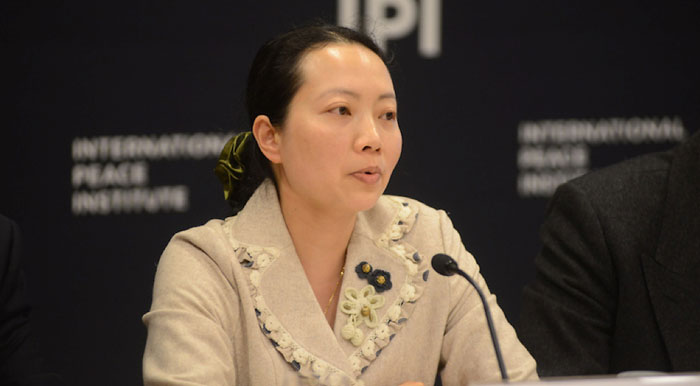
Anne Wu, Special Political Advisor, Office of the Counter-Terrorism Implementation Task Force (CTITF)
“Young combatants are more likely to lay down their weapons if they are provided with the proper opportunities to survive in society,” said Anne Wu, Special Political Adviser at the Office of the Counter-Terrorism Implementation Task Force (CTITF). “So creating employment opportunities would be a potentially effective tool to prevent conflict and counter radicalization.”
Ms. Wu spoke at an event co-hosted by IPI and the Permanent Mission of the Netherlands to the United Nations, on December 14, 2012 entitled “Countering Violent Extremism: Prevention and Lessons Learned.”
For example, “Sixty percent of the population in West Africa is under the age of 20,” she said. “[But] a report by the UN office in West Africa pointed out that youth unemployment in West Africa actually is a ticking time bomb for the region’s security.”
Ms. Wu expressed the importance of education in supporting youth to avoid extremism. She recalled the aspirations of a Russian schoolgirl who spoke four years ago at the Secretary-General Symposium on Supporting Victims of Terrorism.
The schoolgirl was a victim of the Beslan School Siege in September 2004, in which militants occupied a school and held 777 children hostage for three days, ultimately killing 186 of them. According to Ms. Wu, the schoolgirl shared with the Symposium her desire for youth to obtain specialized skills to improve troubled societies.
“Unemployed, marginalized, and impoverished youth are easily recruited and re-recruited into armed conflict and radicalized into violent extremists,” she said.
Naureen Chowdhury Fink, Senior Analyst at the Center on Global Counterterrorism Cooperation (CGCC), said, “We don’t know exactly what prompts an individual to support violent extremist ideas, but we do know that the drivers of radicalization are complex and multifaceted.”
According to Ms. Fink, there are both “push and pull factors” that drive extremism. Push factors include “inequality, lack of access to justice and civil rights, repressive regimes, unresolved conflicts, and marginalization”; and pull factors include “the appeal of ideology, a charismatic leader, peer pressure, and appealing social networks.”
Edward J. Flynn, Senior Human Rights Officer at the Counter-Terrorism Committee Executive Directorate (CTED), encouraged member states to involve civil society in dealing with counterterrorism.
“There are civil society organizations which are concerned that [counterterrorism efforts] have led unfortunately to excesses and human rights violations,” he explained.
Alle Dorhout, Counselor at the Permanent Mission of the Netherlands to the United Nations, described the interrelated societal conditions–what he called demand side, supply side, and context–that breed extremists. According to Mr. Dorhout, the demand side consists of youth who are looking for the “meaning of life” by exploring faith, making sense of international relations, and searching for a place in society; and the “supply” factor consists of al-Qaeda and similar movements who offer these answers through a mix of alluring social, political, and religious narratives.
“Almost everyone has a certain resilience to the extremist discourse,” he explained, “[but] the current social and economic context is a breeding ground for exploitable frustrations.”
“Strong feelings of injustice, group threats, and uncertainty among minority groups… make it easier for recruiters to break through that natural resilience,” he added. “If the context allows that supply meets demand, a process of radicalization may start.”
Ms. Wu shared a CTITF de-radicalization effort in Somalia that empowers the Somali Diaspora by training Somali media professionals and working to give Somali victims of radicalization a voice and a medium to broadcast their messages.
“The peace and hope expressed in victims’ messages are powerful themselves in counter narratives of the narratives of violent extremists,” she explained.
Ms. Fink pointed out that radicalized youth had limited access to information. Young men detained as part of a Pakistani prison’s de-radicalization program, for example, had never heard of the September 11, 2001 terrorist attack in New York City. “They actually didn’t know the story of what happened on that day or what the discussion was really about,” she said.
“I think access to information is a huge problem,” she added.
The event was chaired by Warren Hoge, IPI Senior Adviser for External Relations.
Watch event:







